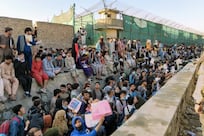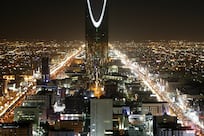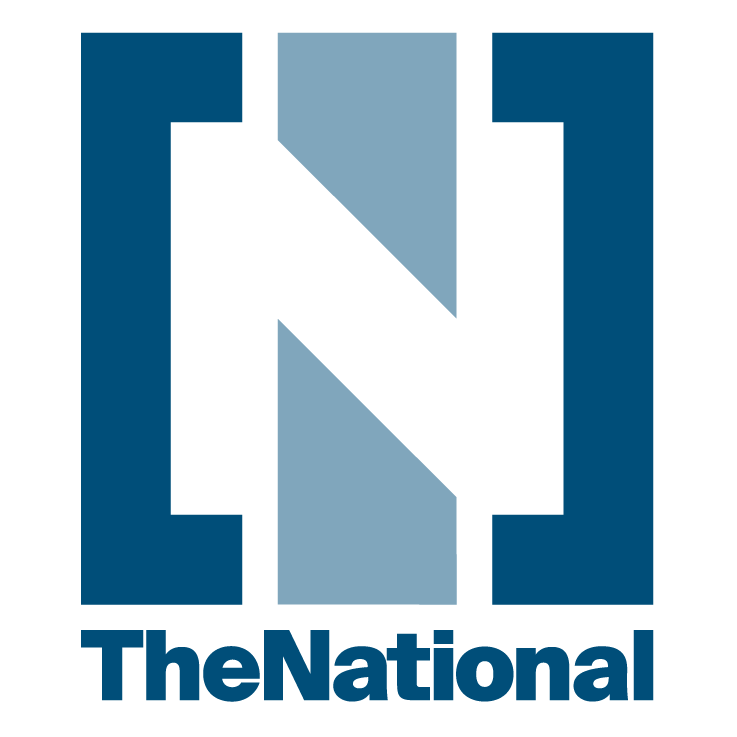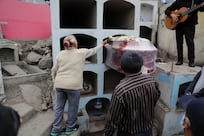The festive atmosphere 32 years ago on a Moscow street marked the opening of McDonald’s first restaurant in Russia. Smiling staff in uniforms stood by the entrance with hundreds of excited people gathered, dozens waving flags adorned with the golden "M", as Pushkin Square became the latest outpost for globalisation.
In a Washington Post article marking the 30 year anniversary of the opening day in 1990, a lady recalled that she ordered a Big Mac just to be able to keep the box it comes in as a souvenir to show her friends.
The entry of western brands in the former Soviet Union quickly went from a trickle to a cascade. By the mid-1990s, former leader Mikhail Gorbachev, whose reforms had paved the way for Russia to join the global community, had even appeared in a Pizza Hut commercial.
The arrival of McDonald’s specifically was a watershed moment. Looking back now, it's hard to overestimate how much McDonald's symbolised the success of globalisation. It was also genuinely welcomed by the people. That Russians could buy Big Macs, too, went a long way to destroy the idea in the West that those who lived behind the Iron Curtain were different. The fear of "the other" began to dissipate.
This week, however, McDonald's said it would temporarily close all 847 of its restaurants in Russia, the latest global brand to announce such a move following Moscow's invasion of Ukraine.
Others halting or scaling back operations in Russia include Coca Cola, Apple, Netflix, Ikea, Adidas and Starbucks. Amid the destruction being wreaked in Ukraine, pressure from customers, investors and politicians have made continuing business as usual in Russia damaging for these companies, even if bowing to the pressure is expensive. For McDonald's, the bill for shuttering its outlets will be about $50 million a month.
Norway’s sovereign wealth fund, for example, is likely to end up writing off about $3 billion worth of assets in Russia after being told by the government to sell them. Its chief executive Nicolai Tangen told Reuters: "[Overall] this is all negative for globalisation."
In the mid-1980s, The Economist newspaper created its Big Mac index comparing the cost of the burger around the world “as a lighthearted guide to whether currencies are at their correct level” but the index shrugged off its origins to become a global standard. Globalisation needed its own linguistic shorthand to explain its success. For a long time it seemed this hegemony, provided by the end of the Cold War, would keep running.
That Big Macs will no longer be sold in roubles for the foreseeable future is the latest signal that globalisation is in desperate need of a reboot. The presence of big brands has not fulfilled the promise that if we all bought and used the same products we would share the same understanding and basic values and that this, in turn, would guarantee peace and reduce the chances of war. Yet, we have forgotten about that last part too often.
Much of the experience of the past few decades has been overly focused on the potential profit of expanding businesses until they span the world, and not enough on the consequences, good and bad, for the societies they aim to serve.
Yet, the downsides have also been clear for a long time but with little action taken. Generations have been left behind in the West, in Asia, Latin America and Africa, all struggling for economic opportunities. In the past decade, these inequalities have become even more stark and visible. They have upended politics and societies.
Technology has only enhanced these problems and globalisation has resulted in massive companies with the sway and scale of countries that governments cannot effectively regulate. Even if globalisation initially managed to lift entire countries out of poverty, it has not continued in this vein. The inequality it has fostered has become a huge global risk, far outweighing the benefits. Nor has climate change been addressed by the free market.
This week, Scotland's Finance Secretary Kate Forbes said: "Any business based here that is still investing in or active in Russia should be aware that in a globalised economy, business has a moral responsibility to play its part.”
There was a time when morality was implied when a country embraced the free market. The theory being that the pursuit of profit was ultimately pure and would ensure bad actors had the incentive to behave well. Good business sense made sense.
Meanwhile, economies have become more interconnected over time.
Russia and Ukraine are vital suppliers of grains, vegetable oil and fertilisers. Russia is a major energy exporter. It is a big manufacturer of aluminium and accounts for about 40 per cent of the global market for palladium.
The reconfiguration of global trade has already begun following the Covid-19 pandemic. We understood the need for resilient supply chains and the value of local suppliers.
Iraq, for example, will now buy the entire domestic wheat harvest at global prices, as it seeks to ensure food security amid the increased uncertainty around supply.
Russia will also reduce its reliance on foreign products and support its businesses in response to sanctions. It may be a long time before Russia returns to the international fold.
It was only 15 years ago, that Goldman Sachs put itself forward as a champion of globalisation with Russia a top market. The US investment bank actively chased the opportunities it saw there as part of its strategy in the emerging markets of Brazil, Russia, India and China. The commodities super cycle that created a new generation of billionaires in the "Bric" nations and elsewhere made the bankers a lot of money.
Yet, that has little meaning anymore in 2022, when precedents are being set daily about how business should be conducted and how its impact should be measured.








